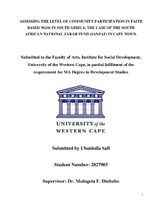| dc.description.abstract | In a country like South Africa, with a history of racial discrimination and man-made social inequalities, many NGOs and FBOs play a crucial and important role in socio-economic development and in narrowing the gap between the haves and the have-nots. As one of the nongovernmental organisations, The South African National Zakah Fund (SANZAF) development projects/programmes have played an important role in the areas of poverty alleviation, skills development, education and disaster relief. In line with the participatory/people-centred theory of community development and conceptual arguments, this study was used to examine the nature of participatory community development at the South African National Zakah Fund (SANZAF) in Cape Town, South Africa. Qualitative research methodology was applied and measurement of the level of community participation was done using a variety of instruments. This study is focused on the SANZAF's community development project in the Manenberg area in the Cape Flats. The analysis involved examining the nature and level of community participation in the project needs, planning, implementation and decision-making phases. Thereafter, the results of the research prompted general observation and provided some recommendations to SANZAF and other FBOs involved. The research findings show that the SANZAF's development projects/programmes have played an important role in terms of community development. They have been developed in response to the needs of local communities and are implemented to mobilise local resources to support the poor and needy. The study also indicated that SANZAF enjoys a strong linkage with local mosques and other development actors at the community level. However, the results of the study also indicated that the level of community participation in planning, decision making and implementation is low in the case study area. Meanwhile, the beneficiaries did not show a clear understanding of aspects such as participation, empowerment and ownership. Finally, a recommendation is made for genuine community participation at the grassroots level as this will contribute to beneficiary's empowerment, capacity building and the core ingredients for selfreliance and project sustainability in community development activities. | en_US |

